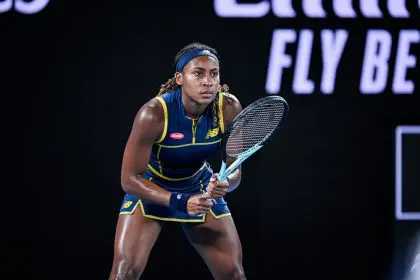
Story by Todd Williams
Images for Steed Media Service
 Before BET, VH1 or MTV, there was one place on television where African Americans could readily see their favorite artists being interviewed and performing their latest hit singles. “Soul Train” was an African American institution. Throughout the 1970s, ‘80s, ‘90s and 2000s, the iconic opening theme (and its countless variations) signaled to many Americans when it was time to get funky on a Saturday. It was the first real glimpse into how black folks threw a party — and it was a staple of weekend television for over 35 years. Since its cancellation in 2007, there has been a void in the entertainment sphere that is unlikely to be filled. There are so many options now — between hundreds of satellite-provided, hi-def channels, to the myriad of music and performance sites on the Internet — that one can’t depend on one show to be the prime source of all things hip and cool.
Before BET, VH1 or MTV, there was one place on television where African Americans could readily see their favorite artists being interviewed and performing their latest hit singles. “Soul Train” was an African American institution. Throughout the 1970s, ‘80s, ‘90s and 2000s, the iconic opening theme (and its countless variations) signaled to many Americans when it was time to get funky on a Saturday. It was the first real glimpse into how black folks threw a party — and it was a staple of weekend television for over 35 years. Since its cancellation in 2007, there has been a void in the entertainment sphere that is unlikely to be filled. There are so many options now — between hundreds of satellite-provided, hi-def channels, to the myriad of music and performance sites on the Internet — that one can’t depend on one show to be the prime source of all things hip and cool.
When the show ceased to produce any new episodes, beginning in 2006, many believed that the end of an era was near. The “Soul Train” brand went through a lull during that period and the awards show that bore its name ceased production. But in 2008, publishing and entertainment company MadVision took up the mantle and purchased the company for distribution.
Since then, the owners, Kenard Gibbs, Peter Griffith and Anthony Maddox, have worked to re-establish “Soul Train” as one of the premier voices in African American entertainment.
“I think that the ‘Soul Train’ brand is such an iconic brand,” Gibbs says. “What it has represented throughout its almost forty-year history has been urban music, and excellent entertainment. And it has also represented a great multigenerational family form of entertainment. You can sit down and watch ‘Soul Train’ with your mother, your grandmother and everybody would find some element of the show that they liked — whether it was the current artists, the fashion or the dancing.”
Gibbs and his partners have passionately worked to return “Soul Train” to its rightful place in the hearts and minds of African Americans and to the forefront of African American pop culture. And in keeping with their mission, the Soul Train Awards will be making their highly anticipated return this year.
“Centric Presents: The 2009 Soul Train Awards” is poised to be one of the biggest events in music. The show will honor the legends of black music and celebrate the brand that has historically supported them — and vice versa. Artists such as Chaka Khan, Charlie Wilson, L.A. Reid and Kenny “Babyface” Edmonds are among the luminaries to be celebrated for their contributions to black popular music and the entire show will be a culmination of all that “Soul Train” has brought to audiences over the years.
“We thought it was important to bring the awards show back because artists — just as when Don initially developed the Soul Train Awards — still need a platform to reach their audience. In spite of and in addition to what they have with radio and the various broadcast outlets that play videos, artists still like to perform in front of an audience that genuinely wants to see them perform, and they want to be a part of a brand that is bigger than them,” says Gibbs.
Gibbs wants to emphasize that this show isn’t just about honoring the legends that have helped shape “Soul Train’s” legacy, but it’s about acknowledging both the past and the future. “I think you’re going to see a show that celebrates the future by looking at the past,” he says. “You’re going to see some things that have been done. But it’s definitely going to be a lot of emphasis on fans and those aspects of the ‘Soul Train’ show that made it so memorable for so many people.”
 Academy Award nominees (and Hustle & Flow co-stars) Taraji P. Henson and Terrence Howard are slated to co-host the star-studded event. Howard’s Oscar nod came from the hip-hop themed Hustle & Flow and he got his start starring as Jackie Jackson in the TV movie “The Jacksons: An American Dream.” Henson was a singer in the aforementioned Flow and actually sang the hook on the controversial Oscar-winning theme song “It’s Hard Out Here for a Pimp.” Both actors have strong ties to the music community … and we can be certain that they’ve both participated in a soul train line or two over the years.
Academy Award nominees (and Hustle & Flow co-stars) Taraji P. Henson and Terrence Howard are slated to co-host the star-studded event. Howard’s Oscar nod came from the hip-hop themed Hustle & Flow and he got his start starring as Jackie Jackson in the TV movie “The Jacksons: An American Dream.” Henson was a singer in the aforementioned Flow and actually sang the hook on the controversial Oscar-winning theme song “It’s Hard Out Here for a Pimp.” Both actors have strong ties to the music community … and we can be certain that they’ve both participated in a soul train line or two over the years.
Gibbs also wants the public to remember the spirit behind the founding of “Soul Train.” Don Cornelius and other entrepreneurial innovators of his generation like the Johnson Family and Earl Graves of Black Enterprise, wanted to make sure that their people had a platform. And that spirit should not only be celebrated, it should be duplicated.
“There’s so much to be learned from how these brands were founded. There was an entrepreneurial spirit and an undeniable vision that the people that launched these brands [had], whether that’s ‘Soul Train’ or [John] Johnson with the Ebony [and] Jet brands,” says Gibbs. “These brands were started by individuals who had a clear vision and a clear understanding of an audience that was desperately underserved. These brands conjure up great feelings of nostalgia and pride and we should support those and work to keep those brands relevant — because we can.”
Gibbs, Griffith and Maddox were ecstatic to be afforded this opportunity. The legacy of “Soul Train” runs parallel with the legacy of all black music that was created in the latter half of the 20th century.
The Soul Train Awards stand as the original celebration of black music in all of its glory — from the power of pure soul, to the grit of deep funk; the glory of dance pop to the smooth silkiness of contemporary R&B, the spirit of reggae and gospel to the brutal honesty of hip-hop. It’s all there on that stage, and we should never forget where the music comes from. The world may dance to it, but it is born in our souls.
“Peter Griffith, Anthony Maddox and myself were driven to buy this brand from Don Cornelius because we shared in Don’s vision for ‘Soul Train’ always being a platform for urban music,” says Gibbs. “We feel that we will be able to harness the new technology and distribution platforms in order to keep the brand relevant.”
And in the age of Facebook and Twitter, there are more and more options for delivering the “Soul Train” experience to the people. “Soul Train” has always been about the people, and in trying times such as these, we all could use a little more love, peace and sooooooooooouuuuuuul!










